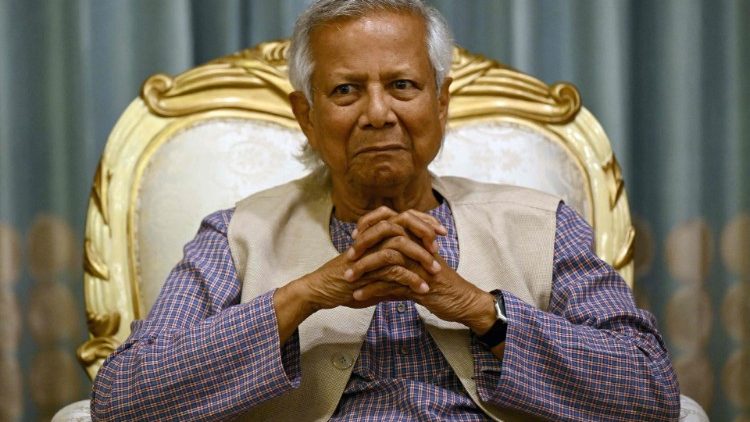Highs and lows of Yunus government's first 100 days in office
Having come to power after the ousting of the historic premier Hasina and the student protests, the interim executive does not seem to meet expectations. The issue of the fight against corruption is unresolved and there is a risk of a growing Islamic drift. Economic challenges, in particular the issue of inflation, continue to weigh on the citizens.
Dhaka (AsiaNews) - Lights and shadows, a mixture of disappointment and cautious optimism. These are the sentiments that prevail among citizens in Bangladesh, 100 days after the birth of the interim government led by Nobel laureate Muhammad Yunus, who replaced the historic premier Sheikh Hasina who had been in power for 15 years, after weeks of protests led by university students.
Formed on 8 August to respond to demands for anti-corruption and better governance, strengthening of the public service and combating the logic of money and inequality, the executive does not seem to have met - at least so far - the expectations of the square.
One of the main slogans of the 2024 student movement that led to the ouster of former Prime Minister Hasina was the building of a Bangladesh without discrimination and inclusive for all sections of society.
With this goal in mind, the interim government that has been in office for just over three months has promised reforms to reduce inequalities between groups and strengthen democratic institutions, stemming a radical Islamic drift.
However, critics argue that progress is still a long way off and is not leading to significant change. Meanwhile, economic challenges, particularly the issue of inflation, continue to plague ordinary citizens.
Rising commodity prices and stagnating wages have undermined livelihoods and reduced the general purchasing power of the population.
The government has not yet taken decisive action to curb the loss of value of the local currency, leaving much doubt as to whether it will be able to keep the promises it made when it came to power. Public order also remains precarious.
Although the government has stabilised the unrest that preceded and accompanied the ouster of the previous executive and Hasina, criminal activity and social tensions have not yet improved significantly.
‘The interim government has not shown much success in controlling inflation or improving law and order,’ Ruhin Hossain Prince, general secretary of the Communist Party of Bangladesh (CPB), confirms to AsiaNews. ‘The people's expectations remain largely unfulfilled and even on the issue of electoral reforms,’ he continues, ‘there has been little progress’. Among others, electoral reform was a cornerstone of the interim government's promises, which also remained in limbo. With elections as the next crucial step, many expected the administration to engage with political parties and civil society to build a consensus on measures to ensure free and fair elections.
And again, Bangladesh's strategic geopolitical position in a changing South Asia adds another layer of complexity. Analysts warn that the inability to effectively address domestic issues could encourage interference by foreign powers seeking to assert their influence.
‘If we fail to solve our problems, imperialist and hegemonic forces will naturally seek to dominate,’ observes Ruhin Hossain Prince, who urges us to “remain vigilant and committed to realising the aspirations of the people”.
Analysts and experts point out that the success or failure of the current executive is likely to depend on its ability to unite political factions, address economic challenges and restore public confidence.
While the interim government faces its challenges, political parties linked to Bangladesh's radical Muslim faction, including Jamaat-e-Islami and smaller factions, argue for a state governed by Islamic principles.
These groups have stepped up efforts to align national governance with Quranic laws, promoting policies that they believe will create a morally upright and intact society.
Observers note that these parties are leveraging the growing dissatisfaction around the secular-leaning executive to promote their agenda. By demanding stricter adherence to Sharia law, they aim to reshape the nation's political landscape.
Admittedly, so far the leaders of the interim government do not seem to have shown any interest in a state governed by Koranic principles, but it is equally true that they cultivate deep relations with Islamist parties.
03/09/2007







.png)










